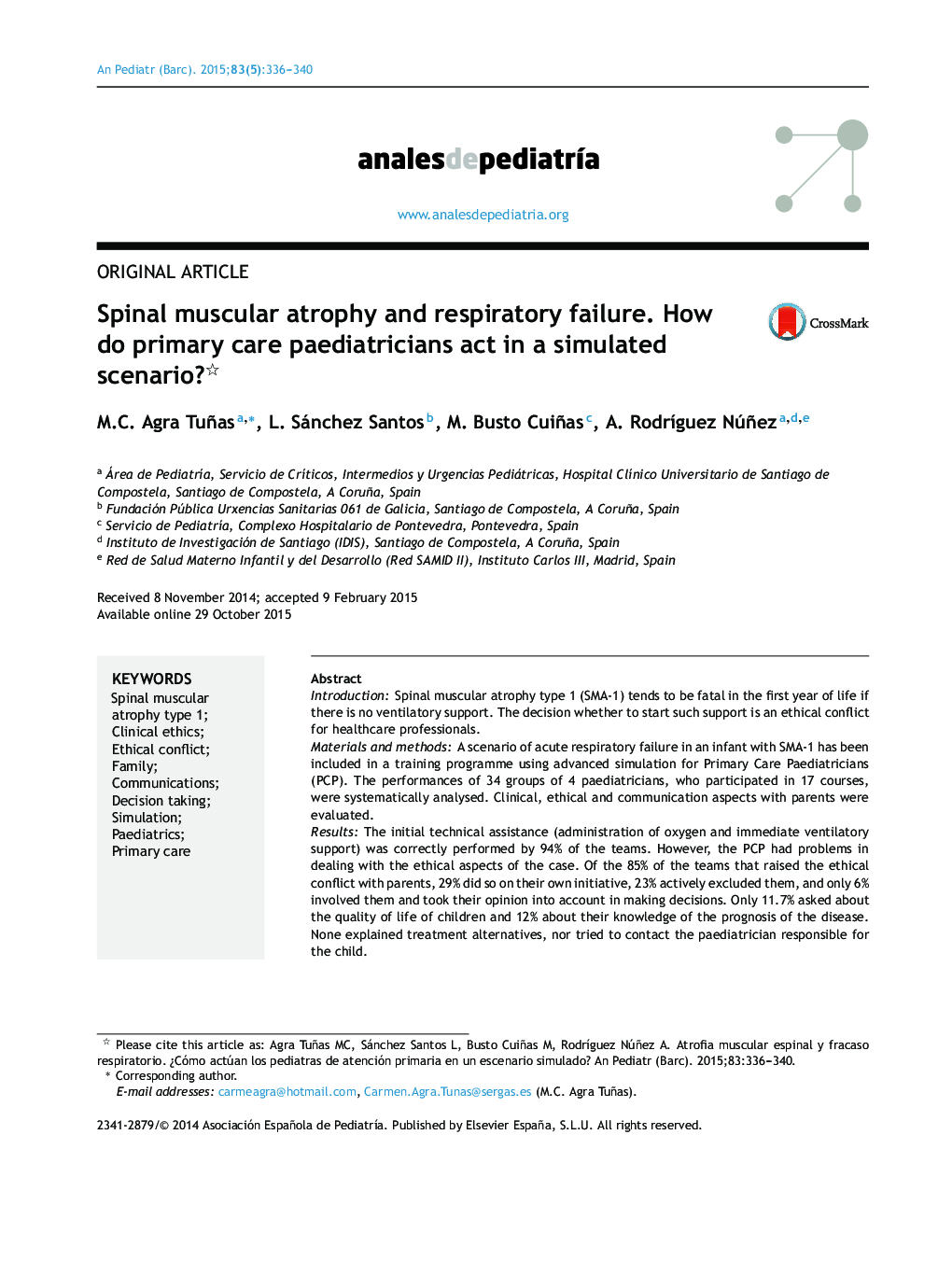| کد مقاله | کد نشریه | سال انتشار | مقاله انگلیسی | نسخه تمام متن |
|---|---|---|---|---|
| 4145002 | 1272580 | 2015 | 5 صفحه PDF | دانلود رایگان |

IntroductionSpinal muscular atrophy type 1 (SMA-1) tends to be fatal in the first year of life if there is no ventilatory support. The decision whether to start such support is an ethical conflict for healthcare professionals.Materials and methodsA scenario of acute respiratory failure in an infant with SMA-1 has been included in a training programme using advanced simulation for Primary Care Paediatricians (PCP). The performances of 34 groups of 4 paediatricians, who participated in 17 courses, were systematically analysed. Clinical, ethical and communication aspects with parents were evaluated.ResultsThe initial technical assistance (administration of oxygen and immediate ventilatory support) was correctly performed by 94% of the teams. However, the PCP had problems in dealing with the ethical aspects of the case. Of the 85% of the teams that raised the ethical conflict with parents, 29% did so on their own initiative, 23% actively excluded them, and only 6% involved them and took their opinion into account in making decisions. Only 11.7% asked about the quality of life of children and 12% about their knowledge of the prognosis of the disease. None explained treatment alternatives, nor tried to contact the paediatrician responsible for the child.ConclusionsWhen faced with a simulated SMA-1 infant with respiratory failure, PCP have difficulties in interacting with the family, and to involve it in the decision making process. Practical training of all paediatricians should include case scenarios with an ethical clinical problem.
ResumenIntroducciónLa atrofia muscular espinal tipo 1 (AME-1) suele ser mortal en el primer año de vida sin soporte ventilatorio. La decisión de iniciar dicho soporte o no, supone un conflicto ético para los profesionales sanitarios.Material y métodosSe incluyó un escenario de fracaso respiratorio agudo en un lactante con AME-1 en un programa de formación mediante simulación avanzada para pediatras de atención primaria (PAP). Se analizaron de forma sistemática las actuaciones de 34 grupos de 4 pediatras que participaron en 17 cursos. Se valoraron los aspectos clínicos, éticos y de comunicación con los padres.ResultadosLa asistencia técnica inicial (administración de oxígeno y soporte ventilatorio inmediato) fue realizada correctamente por el 94% de los equipos. Sin embargo, los PAP tuvieron problemas al abordar los aspectos éticos del caso. Del 85% de los equipos que plantearon el conflicto ético a los padres, lo hizo por iniciativa propia el 29%, el 23% los excluyó de forma activa y solo el 6% los implicaron y tuvieron en cuenta su opinión en la toma de decisiones. Solo el 11,7% preguntó por la calidad de vida del niño y el 12% por su conocimiento del pronóstico de la enfermedad. Ninguno les explicó las alternativas de tratamiento ni trató de contactar con el pediatra de referencia.ConclusionesAnte un caso simulado de AME-1, los PAP tienen dificultades para interactuar con la familia e implicarla en la toma de decisiones. La formación práctica de todos los pediatras debería incluir problemas de ética clínica.
Journal: Anales de Pediatría (English Edition) - Volume 83, Issue 5, November 2015, Pages 336–340